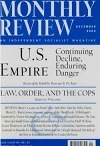Volume 55, Issue 07 (December)

On October 27, 2003, the New York Times ran a guest column on its Op-Ed page by David L. Kirp entitled “How Much for That Professor?” The piece, which was about universities spending big bucks to get professors with star power, focused in its opening and closing paragraphs on the case of Niall Ferguson, described as “the most widely discussed and controversial British historian of his generation.” Last winter, New York University successfully recruited Ferguson away from Oxford University with promises of big money and reduced teaching responsibilities. Barely six months later Harvard lured Ferguson away from New York University with an offer of even bigger rewards | more…
“Global hegemony” might be defined as a situation in which one nation-state plays a predominant role in organizing, regulating, and stabilizing the world political economy. The use of armed force has always been an inseparable part of hegemony, but military power depends upon the economic resources at the disposal of the state. It cannot be deployed to answer every threat to geopolitical and economic interests, and it raises the danger of imperial overreach, as was the case for Britain in South Africa (1899–1902) and the United States in Vietnam (1962–1975) | more…
Why were the modern police created?…It is generally assumed, among people who think about it at all, that the police were created to deal with rising levels of crime caused by urbanization and increasing numbers of immigrants.…Despite its initial plausibility, the idea that the police were invented in response to an epidemic of crime is, to be blunt, exactly wrong. Furthermore, it is not much of an explanation. It assumes that “when crime reaches a certain level, the ‘natural’ social response is to create a uniformed police force. This, of course, is not an explanation but an assertion of a natural law for which there is little evidence.” | more…
Marge Piercy’s sixteenth novel The Third Child was published by Harper Collins last year. Her sixteenth book of poetry, Colors Passing Through Us, was published by Knopf in the spring. Leapfrog Books is putting out a CD of her political poems, Louder, I Can’t Hear You Yet, that should be available by the first of the year | more…
Mahmood Mamdani, When Victims Become Killers: Colonialism, Nativism, and the Genocide in Rwanda (Princeton University Press, 2001), 384 pages, paperback $16.95.
Linda Melvern, A People Betrayed: The Role of the West in Rwanda’s Genocide (London and New York: Zed Books, 2000), 288 pages, hardcover $69.95, paperback $19.95.
In Rwanda, in four months of 1994, as many as a million people were massacred in a well prepared and organized orgy of killing amounting to genocide. Seldom in recorded history has there been such a concentrated frenzy of mass murder of innocent people. How could such a thing have happened? Who was responsible? Could it have been prevented and why wasn’t it? These questions are the subject of the two books under review | more…
